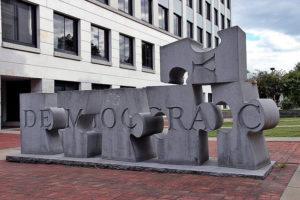The Lure of the Separate: Reflections on Christianity, Nationalism, and Empire

I grew up in South Africa in late apartheid. Now, I am a church historian and curious about how Christianity and themes of national or ethnic identity tended to merge.
Apartheid-era South Africa was perhaps a peculiar, even exceptional case. If one were to ask, what had given rise to the ideology of apartheid, one obvious answer would be the lure of the separate. White Afrikaner people of Dutch origin were early on in the twentieth century imbued with the desire to be separate—in particular, separate from the English, which became something of an overall sensibility of separateness. Much of this had to do with a long history of both real and imagined repression at the hands of the British Empire during the course of the previous century. The culmination of this period of history occurred with the South African War/ Anglo-Boer War (1899-1902), which ended the independence of two Boer republics, the Orange Free State and the Transvaal. South Africa in its entirety was incorporated into the wider British Empire in Africa.
The aftermath of this loss of independence provided a fertile environment for the growth of Afrikaner nationalist sentiments. It quickly became apparent that if the longed-for separateness could not be achieved through independent Afrikaner republics, it would become realized in some other way. Interestingly, after 1948, British rule, which had provided the impetus for Afrikaner nationalism, was no longer the target of the newly ascendant nationalist Afrikaners. Rather, apartheid, the governing policy of the newly elected National Party, was primarily a mechanism for creating and insuring separateness between blacks and whites.
In the South African case, the lure of the separate acquired its own momentum. Separateness, or at least the ideal of the separate, became transferable. The Dutch Reformed church, which imbued Afrikaner people with a sense of elected nationhood, had much to do with this as it had much cultural and religious influence in the Afrikaner mindset.
It might be safe to say that the specific kind of Christianity that tended to be popular among nationalist Afrikaners in the twentieth century narrowly identified the Afrikaner with the biblical Israel: both were seen as a people in search of a homeland. In the aftermath of the Anglo-Boer War the Afrikaners conceived of themselves as a people in the wilderness, seeking to distance themselves from the Empire, which was identified with the biblical Pharaoh and his powerful armies. The biblical land Canaan progressively became the South African land itself. To be sure, it was already inhabited by people, but just as the Canaanites had no rightful claim to a land that was promised to the Israelites, so the indigenous South Africans had to make way and evacuate, if necessary, the spaces the Afrikaners’ God had promised to his people.
Having identified as a people with a specific identity, mission, and destiny, it became well-nigh impossible for the Afrikaners to avoid the lure of the separate. Separateness became the end goal. Of course in an increasingly interconnected world this is problematic and perhaps impossible to achieve. In South Africa, the Afrikaners’ anxiety-ridden dream of achieving the unachievable led to the morally indefensible forty-year long experiment with apartheid.
Apartheid now belongs to the scrapheap of history. Yet, the lure of the separate remains, and in South Africa, in new ways, for instance in the resurgence of Afrikaner ethno-national sentiment grounded in a quasi-sacred history of victory against overwhelming odds. Popularized by singers, musicians, and song-writers, the new ethno-nationalism focuses on myth-imbued historical events such as the nineteenth century Day of the Covenant, celebrating a Boer victory over a Zulu army, and of course the Anglo-Boer War.
That separateness would remain alluring is not unexpected given our history. But this lure also seems increasingly to affect other societies around the world. Anti-immigration lobbies and policies might be inspired by many anxieties, but surely the desire to preserve and create separation between us and them, an in-group and an out-group, is a major motivating factor.
Britain’s still unresolved Brexit is an interesting historic reversal. The former imperial power which caused such havoc and turbulence by intervening in Africa and Asia now seeks to separate itself from the waves of immigration from the European Union, Africa, and Asia. Hence the lure of the separate increasingly affects mindsets on a small island that had formerly desired to be part of something big and global in reach.
A recent article by Greg Smith and Linda Woodhead (2018) shows how religion affected attitudes to Brexit, with empirical evidence pointing to the high percentage of pro-Brexit voters among Church of England members, even when not religiously active. Why? Perhaps because the Church is identified as an important cultural marker of British heritage, values, and so on, and this of Britain’s separate identity.
British evangelicals on the other hand were mostly anti-Brexit. This finding Smith and Woodhead contrast with the USA where in 2016, eighty percent of white evangelicals supported Donald Trump with his separatist policies of wall building, protectionist trade policies, and hostility to international agreements. What does that say about much of white American evangelicalism? In its genuflection to the lure of the separate, is it perhaps comparable to the Afrikaner volkskerk of a former era, or to British Anglicans who think their church’s role is to protect their reactionary ideal of all things past and British? If so, American evangelicals have misunderstood the meaning of evangelical, which concerns outreach rather than self-preservation.
The point of all of this is that the lure of the separate is a temptation rooted in part in the belief that Christianity’s role is primarily about helping to preserve one group’s ideas about other groups. However, Christianity as described in the gospels is not about the preservation of group boundaries but about the erasure of such markers. Those whose versions of Christianity make them vulnerable to the lure of the separate may find themselves heretics within World Christianity traditions, and this might lead to isolation within the wider tradition to which they thought they belong.
#
Retief Müller is Associate Professor of Church History at Stellenbosch University in South Africa. He has a PhD from Princeton Theological Seminary in Mission, Ecumenics, and History of Religion (2008), and has written on various aspects of Christianity in southern and central Africa, including the monograph African Pilgrimage: Ritual Travel in South Africa’s Christianity of Zion (Ashgate, 2011), and several research articles and book chapters in the intervening years. He is interested in the connections between nationalisms, religion, the history of the Protestant missionary movement, and indigenous movements in World Christianity, among other things.
This Counterpoint blog post may be reprinted with the following acknowledgement: “This article was published by Counterpoint: Navigating Knowledge on 6 March 2019.”
The views and opinions expressed on this website, in its publications, and in comments made in response to the site and publications are those of the author(s) and do not necessarily reflect the views and opinions of Counterpoint: Navigating Knowledge, its founders, its staff, or any agent or institution affiliated with it, nor those of the institution(s) with which the author is affiliated. Counterpoint exists to promote vigorous debate within and across knowledge systems and therefore publishes a wide variety of views and opinions in the interests of open conversation and dialogue.



